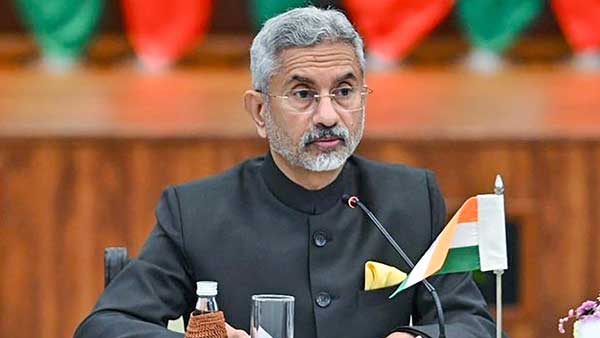
New Delhi: The situation in Ukraine has its roots in post-Soviet politics, NATO expansion and dynamics between Russia and Europe, Minister of External Affairs Jaishankar said on Tuesday, amid rising tensions between Moscow and Russian President Vladimir Putin recognized two Ukrainian regions that separate themselves as independent countries.
In an interactive session in a tank thinker in Paris, he said the world is currently in the middle of “several crises” and this development has produced new challenges with international order.
Separately in an interview published in France Daily Le Figaro on Monday, Mr Jaishankar said that the situation in Ukraine was the result of a complex chain of conditions for the past 30 years and most countries seek diplomatic solutions.
“The situation in Ukraine is the result of a complex state chain for the past thirty years. Most countries, such as India and France, are very active, looking for diplomatic solutions,” he said.
“The real question is: Are you mobilized to find a good solution or are you satisfied with posture? India can talk to Russia, with other countries, in the UN Security Council and support initiative such as France,” Jaishankar said when asked why India had not cursed concentration Russian forces on the Ukrainian border.
The Ukrainian crisis is getting deeper after Russian President Putin announces to recognize two regions that separate themselves in Ukraine as independent countries.
In his speech at the French International Relations Institute, Mr. Jaishankar extended to explore the rapidly growing Indo-French bond and said India looked at France as a “trusted” partner in fighting various security challenges from the seabed to space and from the session to the sea.
“I can affirm with sincere beliefs that (Indo-French bonds) are the strongest now since our trip as an independent country starting 75 years ago,” he said.
“Through the commotion of our day, Indian relations with France continued to move forward with a stable and clear course. This is a relationship that is free of sudden shifts and surprises that we sometimes see in other cases,” Jaisanhar added.
Minister of External Affairs said there was a big belief and confidence in relations in India he also referred to France who showed an understanding of India’s “Strategic Compulsion” after a nuclear test in 1998.
“French support plays an important role in India to get exceptions from the Nuclear Supplier Group in 2008 to continue international cooperation in civilian nuclear energy,” he added.
Asked to compare the Ukrainian crisis with a situation in Taiwan, Mr. Jaishankar said different problems have different history, context and different players and transposing problems from one theater to another can be misleading.
“Both are products from a very complex history of the particular region. In the case of Ukraine, many of which come from post-Soviet politics, NATO expansion, dynamics between Russia and Europe, and Russia and the West are widely,” he said.
“I think, in the case of Taiwan, it is a product of what happens in Chinese history and what happens by cold war and other developments playing in Asia,” he said.
In the East Ladakh border line with China, Mr. Jaishankar said both parties held 13 rounds of military talks and as a result of significant progress had been made in many friction points.
At the same time, he said there were some friction points left to be resolved.
Jaisankar said India was really clear that it would not approve any changes in the status quo and would not accept any effort to change the actual control line unilaterally.
“So, however, the complex, however long it takes, no matter how difficult it is, the clarity is what guides us and I will say other than optimism, it is also very important to have perseverance,” he replied to the question of whether he was optimistic about the resolution of the line.
Asked about the view of India about the grouping of trilateral aukus security (Australia, England and the US), Mr Jaishankar did not give a direct reply.


